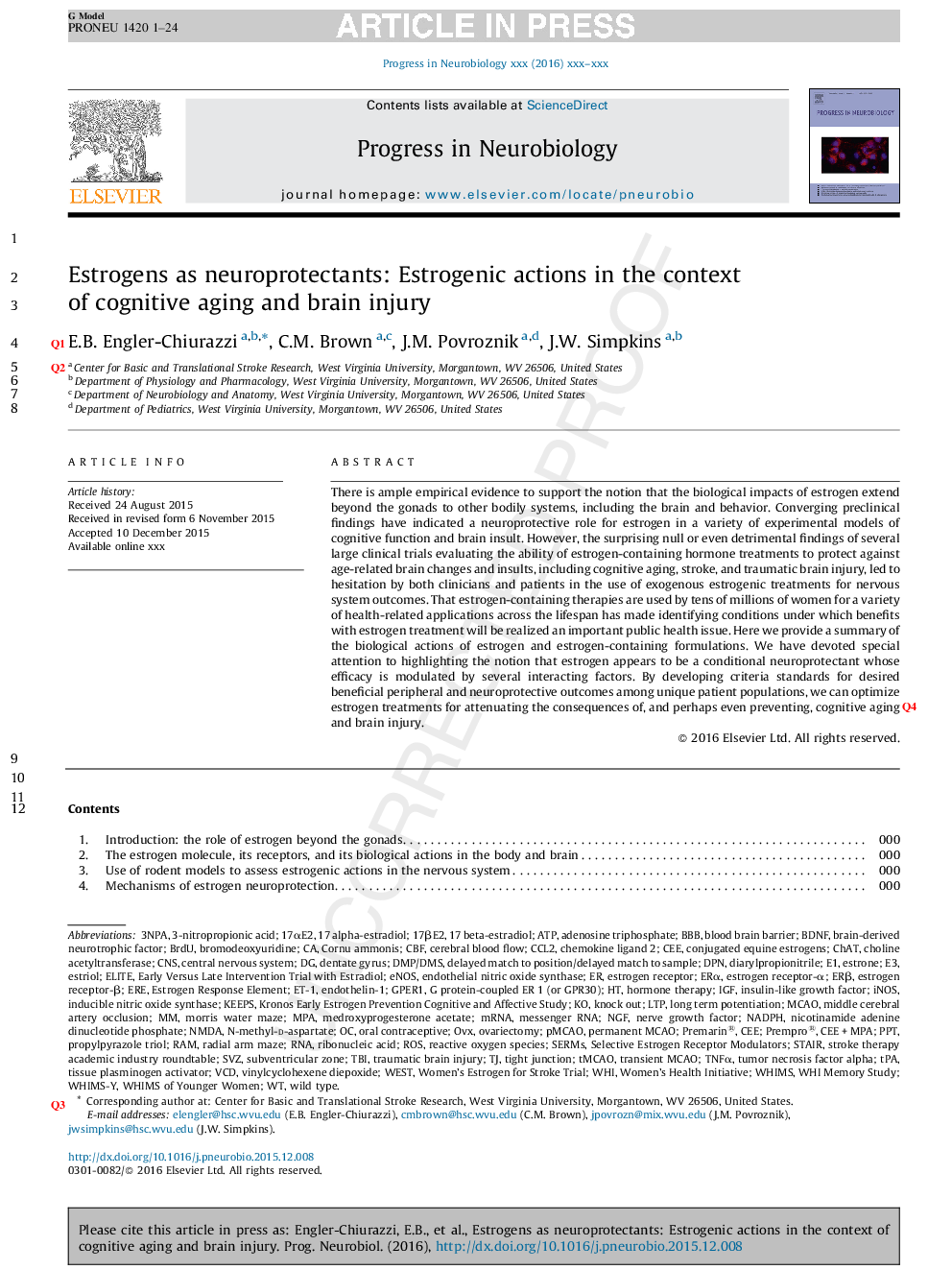| کد مقاله | کد نشریه | سال انتشار | مقاله انگلیسی | نسخه تمام متن |
|---|---|---|---|---|
| 5739072 | 1615358 | 2017 | 24 صفحه PDF | دانلود رایگان |
عنوان انگلیسی مقاله ISI
Estrogens as neuroprotectants: Estrogenic actions in the context of cognitive aging and brain injury
ترجمه فارسی عنوان
استروژن به عنوان نوروپروتکتانت: اقدامات استروژنیک در زمینه پیری شناختی و آسیب مغزی
دانلود مقاله + سفارش ترجمه
دانلود مقاله ISI انگلیسی
رایگان برای ایرانیان
کلمات کلیدی
iNOSET-1VCDDiarylpropionitrileMCAOpermanent MCAON-methyl-d-aspartateTransient MCAONMDAWHIMSERβpMCAOTBIMPATMCAOeNOSERECEECBFNGFCCL2NADPHIGFSVZOVXTNFαERαtPADPNPPTmRNAKEEPSGPER13-nitropropionic acid - 3-اسید نیتروپروپیونیکBDNF - BDNF یا فاکتور نورونزایی مشتقشده از مغز messenger RNA - RNA messengerROS - ROSSERMs - SERM هاAdenosine Triphosphate - آدنوزین تری فسفاتATP - آدنوزین تری فسفات یا ATPTraumatic brain injury - آسیب تروماتیک مغزWomen's Health Initiative - ابتکار بهداشت زنانTight junction - اتصال تنگEstrone - استرونEstrogen - استروژنconjugated equine estrogens - استروژن های اسب سواری کانژوگهestriol - استریولribonucleic acid - اسید ریبونوکلئیکRNA - اسید ریبونوکلئیکendothelin-1 - اندوتلین-1middle cerebral artery occlusion - انسداد شریان (سرخرگ) مغزی میانیOvariectomy - اوفورکتومی، تخمدان برداریcornu ammonis - بال آمونBrdU - بروموداکسی اوریدینbromodeoxyuridine - برومودسوویریدینlong term potentiation - تقویت طولانی مدتLTP - تقویت طولانی مدت یا LTP tumor necrosis factor alpha - تومور نکروز عامل آلفاcerebral blood flow - جریان خون مغزیCNS - دستگاه عصبی مرکزیRam - رمAging - سالخوردگیBBB - سد خونی مغزیblood brain barrier - سد خونی مغزیinducible nitric oxide synthase - سنتاز اکسید نیتریک القاییendothelial nitric oxide synthase - سنتاز اکسید نیتریک اندوتلیالStroke - سکته مغزیStroke Therapy Academic Industry Roundtable - سکته مغزی جلسه علمی صنعت گردشگریcentral nervous system - سیستم عصبی مرکزیCognition - شناختdentate gyrus - شکنج دندانه دارestrogen response element - عنصر پاسخ استروژنWest - غربnerve growth factor - فاکتور رشد عصبInsulin-like growth factor - فاکتور رشد مانند انسولینBrain-derived neurotrophic factor - فاکتور نوروتروفی مشتق شده از مغزtissue plasminogen activator - فعال کننده بافتی پلاسمینوژنchemokine ligand 2 - لیگاند شیمیایی 2Morris water maze - ماز آب آب موریسmedroxyprogesterone acetate - متروکسی پروژسترون استاتNeuroprotection - محافظت نورونی یا محافظت از عصبSelective estrogen receptor modulators - مدولاتور گیرنده استروژن انتخابیsubventricular zone - منطقه فرعیknock out - ناک اوتElite - نخبهwild type - نوع وحشیnicotinamide adenine dinucleotide phosphate - نیکوتین آمید adenine dinucleotide phosphateHormone therapy - هورمون درمانیwhi - وایStair - پلهOral contraceptive - پیشگیری از بارداری خوراکیRadial arm maze - پیچ و خم بازوی شعاعیChAT - چتcholine acetyltransferase - کولین استیل ترانسفرازReactive oxygen species - گونههای فعال اکسیژنEstrogen receptor - گیرنده استروژنEstrogen receptor-α - گیرنده استروژن- αEstrogen receptor-β - گیرنده استروژن- β
ترجمه چکیده
شواهد تجربی فراوان برای حمایت از این مفهوم است که اثرات بیولوژیکی استروژن در خارج از ژن ها به سایر سیستم های بدن، از جمله مغز و رفتار، گسترش می یابد. یافته های مقدماتی همسان سازی نشان می دهد که نقش عصبی محافظتی برای استروژن در انواع مدل های تجربی عملکرد شناختی و دوری مغز وجود دارد. با این حال، یافته های ناخوشایند یا حتی مضر چندین آزمایش بزرگ بالینی که ارزیابی توانایی هورمون های حاوی هورمون حاوی استروژن را برای محافظت در برابر تغییرات مغزی و توهین های مرتبط با سن، از جمله پیری شناختی و آسیب مغزی، موجب تردید توسط پزشکان و بیماران در استفاده از درمان های استروژن خارجی برای نتایج سیستم عصبی. این درمان های حاوی استروژن شامل ده ها میلیون زن برای انواع برنامه های کاربردی مرتبط با سلامت در طول عمر، شرایطی را مشخص می کند که تحت تاثیر آن درمان های استروژن یک موضوع مهم بهداشت عمومی است. در اینجا ما خلاصه ای از فعالیت های بیولوژیکی ترکیبات استروژن و استروژن را در زمینه پیری، شناخت، سکته مغزی و آسیب مغزی آسیب دیده ارائه می دهیم. ما توجه خاصی به برجسته کردن این مفهوم داشتیم که استروژن به نظر می رسد یک عصب شرطی است که اثربخشی آن توسط تعدادی از عوامل تعاملی تعدیل شده است. با توسعه استانداردهای معیار برای نتایج مطلوب مفید محیطی و عصبی در میان جمعیت های منحصر به فرد بیمار، ما می توانیم درمان های استروژن را برای تضعیف عواقب و شاید حتی جلوگیری از عواقب شناختی و آسیب مغزی بهینه سازی کنیم.
موضوعات مرتبط
علوم زیستی و بیوفناوری
علم عصب شناسی
علوم اعصاب (عمومی)
چکیده انگلیسی
There is ample empirical evidence to support the notion that the biological impacts of estrogen extend beyond the gonads to other bodily systems, including the brain and behavior. Converging preclinical findings have indicated a neuroprotective role for estrogen in a variety of experimental models of cognitive function and brain insult. However, the surprising null or even detrimental findings of several large clinical trials evaluating the ability of estrogen-containing hormone treatments to protect against age-related brain changes and insults, including cognitive aging and brain injury, led to hesitation by both clinicians and patients in the use of exogenous estrogenic treatments for nervous system outcomes. That estrogen-containing therapies are used by tens of millions of women for a variety of health-related applications across the lifespan has made identifying conditions under which benefits with estrogen treatment will be realized an important public health issue. Here we provide a summary of the biological actions of estrogen and estrogen-containing formulations in the context of aging, cognition, stroke, and traumatic brain injury. We have devoted special attention to highlighting the notion that estrogen appears to be a conditional neuroprotectant whose efficacy is modulated by several interacting factors. By developing criteria standards for desired beneficial peripheral and neuroprotective outcomes among unique patient populations, we can optimize estrogen treatments for attenuating the consequences of, and perhaps even preventing, cognitive aging and brain injury.
ناشر
Database: Elsevier - ScienceDirect (ساینس دایرکت)
Journal: Progress in Neurobiology - Volume 157, October 2017, Pages 188-211
Journal: Progress in Neurobiology - Volume 157, October 2017, Pages 188-211
نویسندگان
E.B. Engler-Chiurazzi, C.M. Brown, J.M. Povroznik, J.W. Simpkins,
